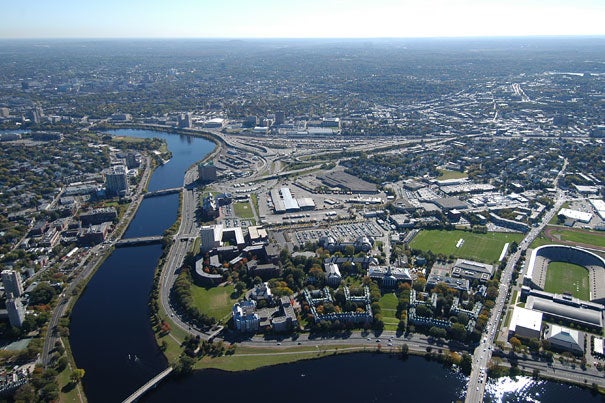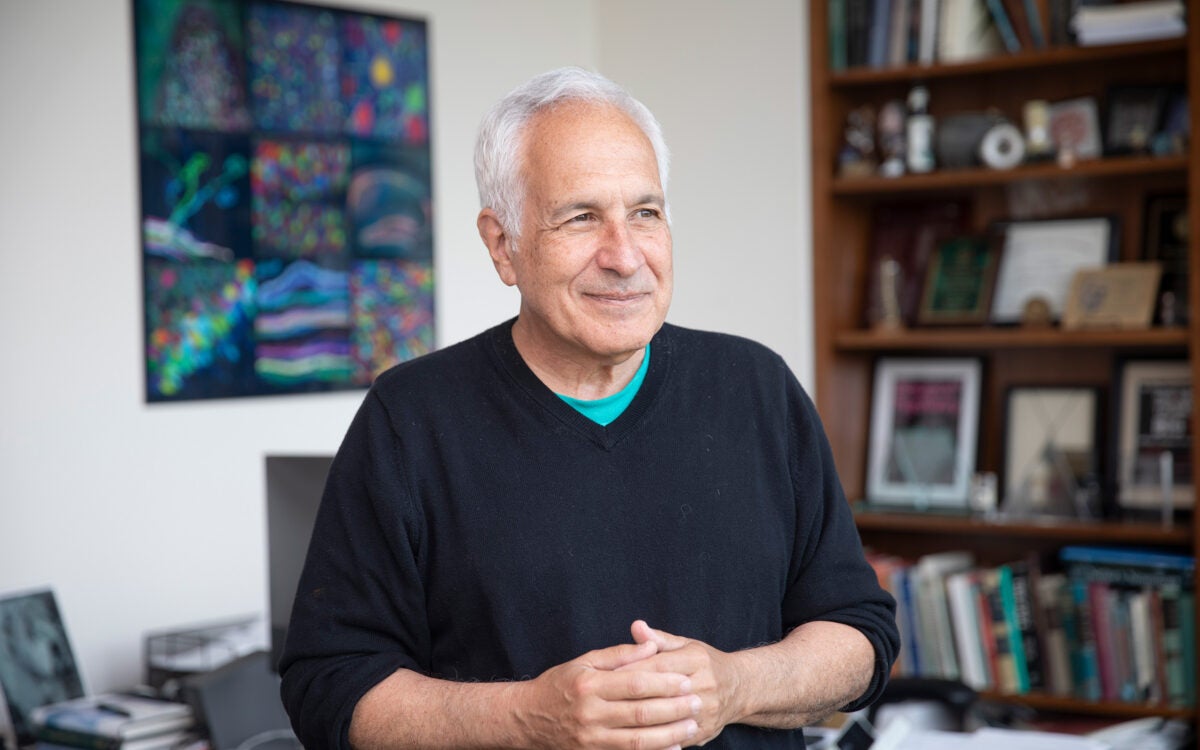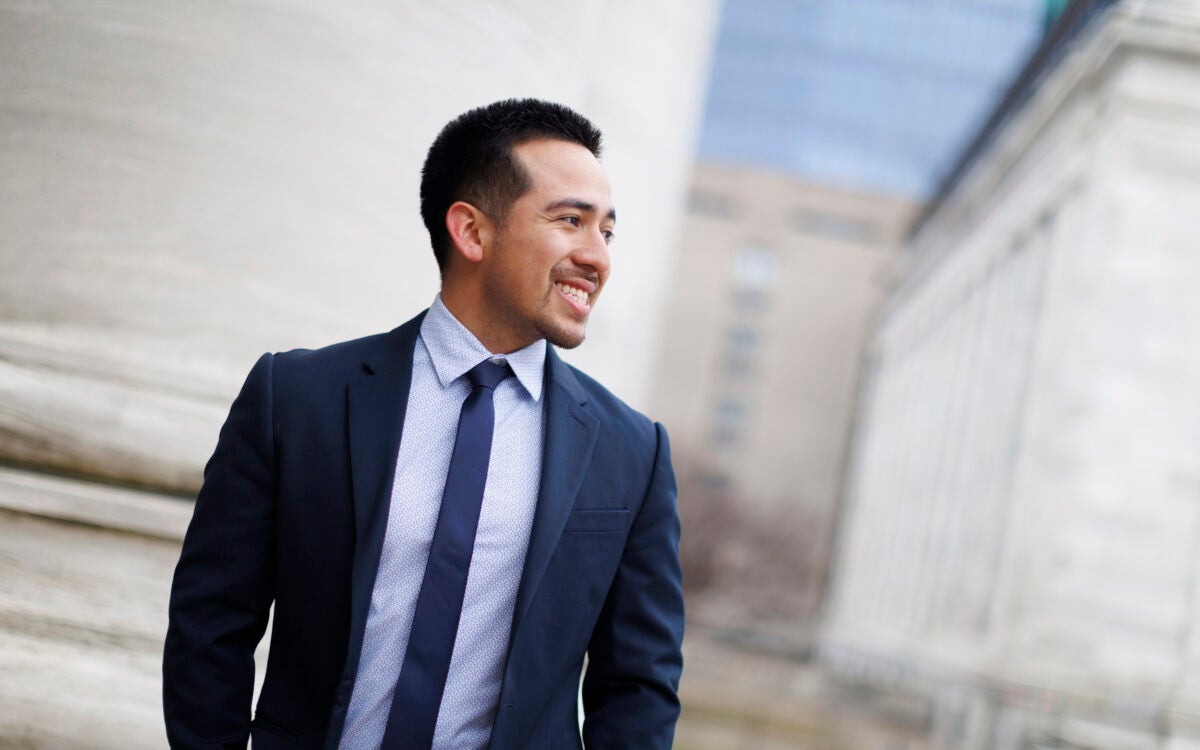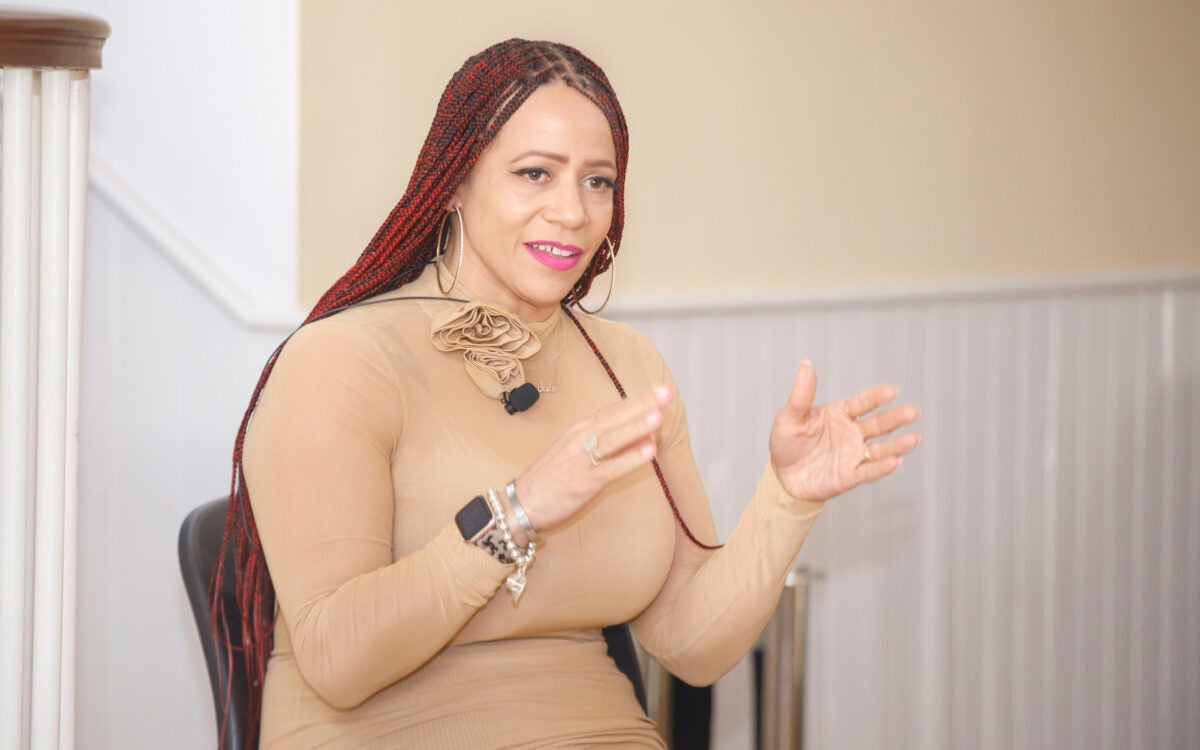
The Harvard Allston Work Team’s recommendations highlight institutional, academic, and community opportunities and lay out concrete development options over the next decade.
Photo by Peter Vanderwarker
Recommendations for Allston
Work Team proposes resuming planning and development
The Harvard University Allston Work Team presented its recommendations today (June 16) to Harvard President Drew Faust.
The report reaffirms the University’s commitment to Allston and points to development options in the next decade, including science facilities, housing, and a private-sector enterprise research campus. The recommendations highlight institutional, academic, and community opportunities and lay out concrete development options over the next decade.
“I am grateful to the Work Team for its hard work and resulting recommendations,” said Faust. “Allston is integral to Harvard’s future, and these ideas both affirm previous planning principles and inject fresh thinking, particularly in their focus on innovation and on private-sector partnerships for near-term development.
“The importance of accommodating anticipated science growth at Harvard and its affiliates can’t be overstated, and Allston is critical in this regard. Our momentum in multidisciplinary science will translate into momentum in the upcoming capital campaign, and momentum in Allston. We look forward to seeking development partners for housing and for an enterprise research campus, consulting with the deans and the new provost on next steps in science, and working with the broader community on other next steps.”
The five recommendations, which consider institutional needs, resource availability, and ways to sustain community-building capacity in Allston, are:
- Resume planning and development on the Western Avenue foundation as an innovative interdisciplinary health and life science center. This would include building a 500,000 to 700,000 square-foot facility to accommodate the growth of Harvard’s health and life sciences.
- Create an enterprise research campus in Allston Landing North, opening a gateway to a collaborative community for business, investment capital, research, and science development. The Work Team recommends that the University complement institutional growth by attracting business, investment capital, research, and science development entities.
- Enhance the vibrancy in Barry’s Corner through new rental housing, retail, and other amenities. This would include new housing for faculty and graduate students, as well as other community amenities (such as retail and day care) to complement the housing development currently under way in the community.
- Enable future institutional growth by preserving land adjacent to the existing campus, and advance academic planning to determine next steps.
- Explore the feasibility of a state-of-the art conference center and hotel to accommodate the academic and research sectors.
Led by Work Team co-chairs Bill Purcell, Alex Krieger, and Peter Tufano, the 14-member body comprising deans, faculty, and alumni drew from their collective expertise in institutional and academic planning, urban design, public policy, business strategy, and real estate development.
The recommendations were developed over many months, with extensive research into other academic institutions, consideration of the University’s financial resources, intensive discussions of the University’s academic needs, and analysis of past planning documents, as well as community-needs assessments and conversations.
“It has been a privilege to co-chair the group charged with exploring what Harvard can do in Allston,” said Purcell. “We were informed by past planning and new models for partnering. We took seriously the president’s charge to think creatively and practically about the future.”
“We entered this process with a clear understanding that in the current climate you can’t go it alone,” said Tufano, Sylvan C. Coleman Professor of Financial Management at Harvard Business School. “Other universities have had tremendous success in attracting development partners to create integrated academic and business districts.”
“Universities, without question, have gravitational pull. We’ve seen this success at other universities that have created integrated research campuses,” said Krieger, professor in practice of urban design at the Harvard Graduate School of Design. “The real estate in Allston Landing North is unmatched in the region, and the opportunity for development that supports broader health care and life sciences communities in Boston is tremendous.”
The Work Team sought the counsel of land experts and development consultants to understand current market conditions and alternative development methods, such as co-development (building with a partner), long-term ground leases, and co-location (development next to a partner organization).
“Having worked with many institutions, we were impressed with the expertise and commitment that the Allston Work Team demonstrated as it undertook an assignment that has resulted in thoughtful recommendations that will put the University on the right path toward development,” said Bill McCall, president and principal of McCall & Almy, a local real estate firm that consulted with the Work Team.
“The Harvard Allston holdings represent one of the most promising real estate development opportunities in the country. The Work Team recommendations present a path that can unlock that potential and take into account and balance the interests and objectives of the University, the community, and the market,” said McCall.
During the Work Team process, the University followed through on promises made when the pause in construction was initially announced and embarked on new projects that will benefit both Harvard and the city of Boston. They include:
Share this article
- Continuing to invest in community programming and local nonprofits. This year, the Harvard Allston Partnership Fund provided $100,000 to eight Allston-Brighton nonprofits, including the Vocational Advancement Center, the Gardner Pilot Academy, the West End House Girls Camp, the Literacy Connection, and the Joseph M. Smith Community Health Center.
- Bringing 13 new businesses and nonprofits to Allston. Harvard now hosts 61 businesses that employ nearly 900 people.
- Investing in the new Charlesview Residences in Brighton Mills. This development broke ground in May.
- Completing community improvement projects. These include Library Park, a 1.74-acre public space located behind the Honan-Allston Branch Library.
- Breaking ground on the Innovation Lab at 125 Western Ave. The Innovation Lab is a new and innovative initiative that will foster team-based and entrepreneurial activities and deepen interactions among students, faculty, entrepreneurs, and members of the Allston community.
- Announcing plans for Tata Hall, a new $100 million executive education project on Harvard Business School’s campus.




